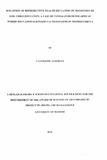| dc.description.abstract | Reproductive Health Education (RHE) in Kenya is aimed at increasing awareness of
responsible sexual activities especially among the youth. The availability of these
services and the vigorous efforts by the government and some Non-Governmental
Organizations (NGOs) have helped reduce unwanted teenage pregnancy, sexually
transmitted infections and have improved their knowledge on reproductive behaviour,
sexual and reproductive health among others.The purpose of this study was to establish
the influence of reproductive health education on promotion of girl-child education
amongst those enrolled in FA WE-K programme in Western Kenya. Study data was
collected using questionnaires (closed-ended and open-ended) from a study sample of 76
respondents comprising of 64 students, 8 teachers and 4 community representatives.
Statistical analyses included both descriptive and inferential statistics, using both
Microsoft Excel 2010 and Statistical Package for Social Sciences (SPSS) version 20 and
then the results were presented in the form of tables and percentages employing both
qualitative and quantitative techniques. Qualitative data were analyzed using content
analysis, whereas quantifiable data was coded and analyzed using SPSS. The study has
established that reproductive health education influences promotion of girl child
education. Training girls on reproductive health related issues such as sex education, use
of condoms, peer interaction, guidance and counseling has influence on the promotion of
the girl-child education. The study also showed that girls benefited from the training in
many ways such as improving life skills, raising self-esteem and self-confidence and
empowering them to aim higher in their education. The study further revealed that
training teachers on RHE had influence on promotion of girl-child education through
creating positive attitude towards girl-child education amongst the community members,
safeguarding girls' rights at school, providing guidance and counseling to the girls and
understanding girls better in relation to their reproductive health needs. The study also
established that sensitizing community members yielded a positive response since they
now appreciate girl-child education; understand girls' rights and issues related to
reproductive health. In addition, the study showed that reproductive health education was
effective on improvement of their academic performance. | en_US |

